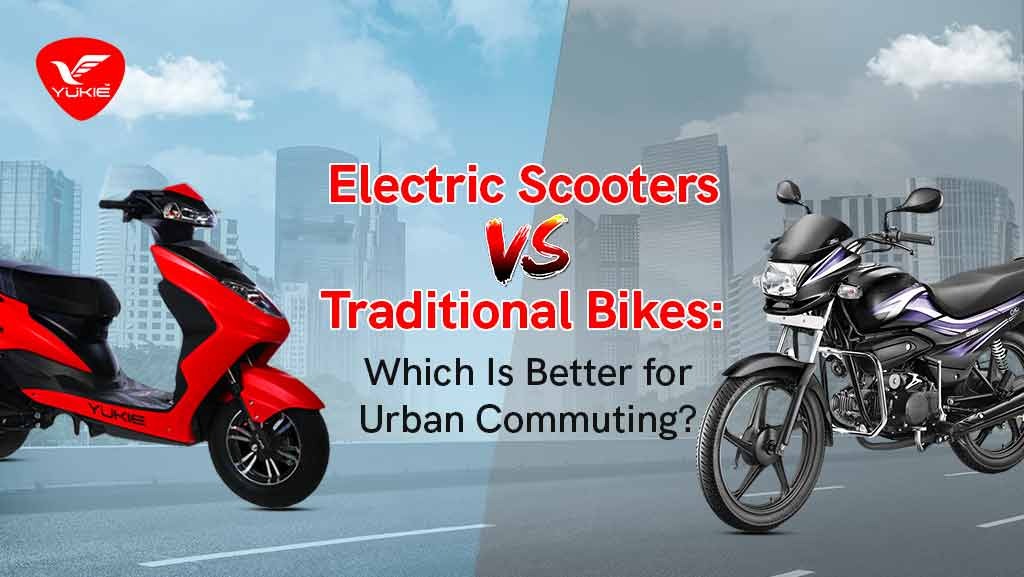Introduction
Urban commuting has become a significant concern for many individuals as cities continue
to expand, and traffic congestion becomes a norm. In recent years, a new trend has
emerged in the form of purchasing electric scooters in India, offering an alternative mode of
transportation to traditional bikes. This blog aims to compare electric scooters and traditional
bikes in terms of various factors such as convenience, environmental impact,
cost-effectiveness, safety, health benefits, and overall suitability for urban commuting.
Convenience
One of the primary considerations when choosing a mode of transportation for urban
commuting is convenience. Electric scooters are compact and lightweight, making them
easy to maneuver through crowded streets and narrow lanes. They can be quickly folded
and carried onto public transport or stored in small spaces, allowing for seamless integration
with other modes of commuting. Traditional bikes, on the other hand, maybe bulkier and
sometimes require additional storage space. However, bikes provide the advantage of being
able to go off-road and explore areas where scooters may face limitations. They also offer
the option of attaching baskets or racks to carry cargo.
Environmental Impact
As sustainability becomes a growing concern, it is essential to evaluate the environmental
impact of our daily commute. Electric scooters have gained popularity for their eco-friendly
nature. Powered by rechargeable batteries, they produce zero emissions, reducing air
pollution in urban areas. Additionally, their compact size contributes to less road
overcrowding and requires fewer resources to manufacture compared to cars. Traditional
bikes also have minimal environmental impact, as they rely solely on human power. Unlike
scooters, bikes do not require electricity, making them even more environmentally friendly.
Cycling emits zero emissions, reduces traffic congestion, and plays a part in mitigating
climate change.
Cost-Effectiveness
Another crucial aspect to consider is the cost-effectiveness of both options. best electric
scooter in India tends to have a higher upfront cost compared to traditional bikes. However,
their maintenance costs are generally lower, as they do not require regular tune-ups or fuel
expenses. The cost of recharging the battery is minimal compared to the cost of gasoline for
bikes or cars. On the other hand, bikes have a lower initial investment, and their
maintenance can be done without any professional help. Bikes only require occasional
repairs and replacements of simple parts, such as tubes and chains, making them a more
cost-effective option in the long run. Moreover, the only recurring expense is energy in the
form of calories for the rider.
Safety
Safety is of utmost importance when considering any mode of transportation. The best
electric scooter company in India, while convenient, can pose certain safety risks due to its
high speed and lack of protective structure. Collisions, falls, and accidents can occur,
especially in areas with heavy traffic. Riders must follow traffic rules, wear protective gear,
and practice caution while riding top electric scooters in India. Traditional bikes, on the other
hand, provide more stability and control for riders. They allow for better maneuverability and
come with the option of additional safety features and accessories, such as helmets, lights,
and reflective gear. Bikes also offer the advantage of being more visible to other road users
due to their larger size.
Health Benefits
Besides the practical aspects, it is important to consider the health benefits associated with
urban commuting. purchase electric scooters in India offer a convenient and efficient way of
getting around the city but require minimal physical effort. They are a suitable option for
individuals who have limited mobility or prefer a less strenuous mode of transportation.
However, the lack of physical exertion can be seen as a disadvantage for those looking to
incorporate exercise into their daily routines. On the other hand, traditional bikes provide an
excellent form of exercise, contributing to improved cardiovascular health, increased
stamina, and reduced stress levels. Cycling regularly can also help in weight management,
muscle strength, and overall fitness. It is a convenient way to incorporate physical activity
into a daily routine, saving time and cost associated with gym memberships or separate
exercise regimens.
Conclusion
In conclusion, India’s best electric scooters and traditional bikes have advantages and
disadvantages when it comes to urban commuting. Electric scooters offer convenience, zero
emissions, and ease of use in crowded city environments. They are suitable for
short-distance travel and provide an excellent alternative to cars and public transport.
Traditional bikes, on the other hand, provide a cost-effective and eco-friendly option that
promotes physical activity. They are versatile, allowing for exploration off-road and offering
options for carrying cargo. Ultimately, the choice between the two depends on personal
preferences, the specific city environment, and individual needs. Whichever mode of
transportation one chooses, embracing sustainable and efficient commuting practices is vital
for a greener and healthier urban future.
